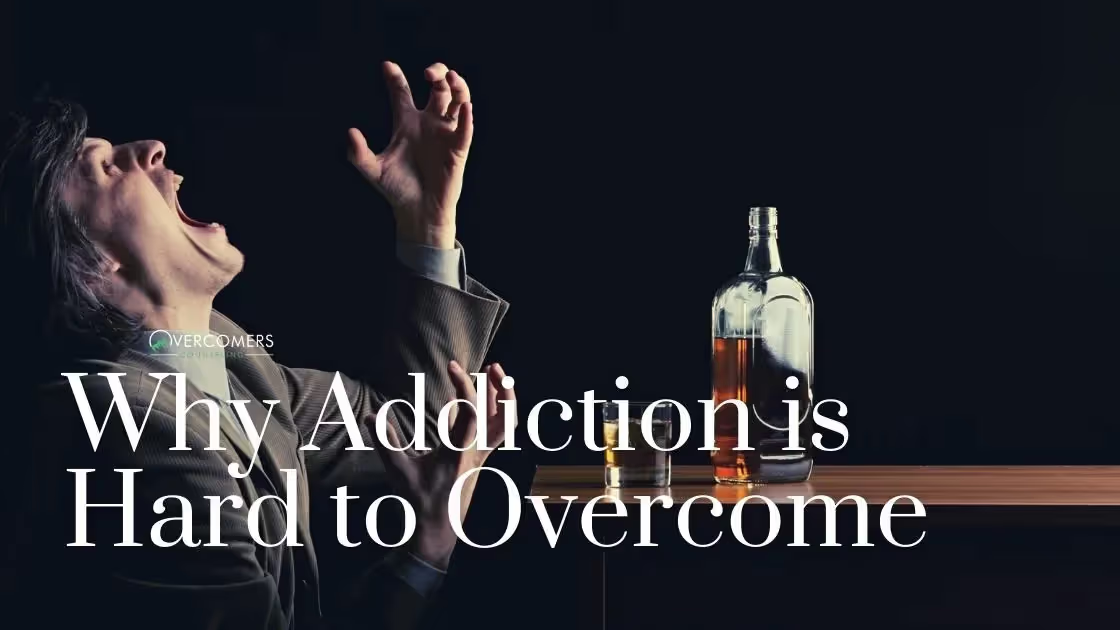If you or someone you love is struggling with substance abuse, you're probably wondering why addiction is hard to overcome.You might be watching someone...

If you or someone you love is struggling with substance abuse, you're probably wondering why addiction is hard to overcome.
You might be watching someone choose their addiction over their kids or their career.
Or, you might be struggling to quit yourself.
You might have tried many times to kick your habit.
Don't worry, it's common to try many times before finally being successful.
This is because addiction is hard to overcome.
Addiction is hard to overcome because it actually alters your brain and then eventually your behavior making it harder to quit.
Substances like alcohol and drugs may seem like they provide comfort or pleasure at first.
But, eventually, addictions cause problems that only they can solve.
Every time you do something, your brain creates a chemical response.
If the thing that you're doing is enjoyable, your brain produces a chemical called dopamine.
Dopamine triggers your brain's pleasure centers and makes you feel good.
This happens anytime you do something enjoyable like when you pet a puppy, meditate in the sunlight, or have great sex.
Dopamine makes us feel good.
However, your brain also produces dopamine when you take drugs like heroin, cocaine, or prescription painkillers or drink large amounts of alcohol.
Except the synthetic nature of pleasure causes your brain to produce a much larger amount of dopamine than with normal activities.
This is why people who use drugs or alcohol tend to feel high or euphoric.

This flood of dopamine causes disruptions in your brain chemistry.
Think of it as a heavy storm coming through and drenching the ground compared to a light rain that only leaves a dusting of water.
Your brain is a highly-flexible organ: scientists refer to the brain's ability to change and adapt as neuroplasticity.
It's your brain's ability to adapt and learn. If you've ever spent time around a child, then you've seen neuroplasticity firsthand.
Think of how children have an easier time learning languages; it's because their brains are developing because of neuroplasticity.
Unfortunately, this amazing ability can work against us.
Neuroplasticity is a big part of the reason that addiction is so hard to overcome.
The brain begins to change because of addiction and adapt to the substance.
Although our brain's plasticity is a gift that helps us grow and survive, it can be hijacked by addiction to keep us stuck in a cycle of addiction.
This means if you or someone you know has struggled to quit: it's not their fault.

When you begin using drugs or drinking regularly, your brain begins producing these large amounts of dopamine regularly.
This means that your brain is getting regularly flooded and so you stop noticing when it produces the normal smaller amounts.
Eventually, you'll start to experience less pleasure when doing things you used to enjoy.
Things that used to give you pleasure won't be able to produce the amounts of dopamine that drugs or alcohol do.
The addictive substance will come to seem as if it's the only source of joy or motivation in your life because it's the only activity producing adequate amounts of dopamine.
When it's the only thing in your life capable of giving you pleasure, your addiction will be hard to overcome.
Some studies have suggested that focusing on pleasure in normal activities can shift this back toward balance.
So, healing from addiction isn't just about quitting the addiction, but also about rediscovering the things you used to enjoy.
Dopamine isn't just about pleasure. It's the chemical in your brain that performs mood regulation, motivation, and focus.
There's an actual chemical reason why so many people who struggle with addiction struggle with being productive.
The dopamine storm in their brain creates a cloud storm over their ability to focus and a dark sky over their mood.
Long-term addiction can also lead to depression which makes addiction even harder to overcome.
The changes to dopamine in production in the brain causes mood swings and an ability to focus.
This often makes it harder for someone who is abusing substances to work or accomplish their goals.
Addiction actively interferes with your ability to be successful in every part of your life.
Of course, all of these struggles just create a storm of bad feelings inside which leads to more substance abuse.
The changes that addiction makes to the brain lead to a difficult, looping cycle of always trying to feel better.
And this cycle makes addiction harder to overcome.
First, take a deep breath.
Second, know that you can overcome your addiction. And, try even though it's hard to believe that you can because that's an important step too.
Don't let the knowledge that addiction is hard to overcome convince you that it's impossible. Let it comfort you that it's not your fault.
And, realize that if it's hard for you, then it's hard for others.
Reach out to someone for support. Addiction can often trick us into self-isolating. Don't let it do that.
Addiction is hard to overcome because it changes your brain. However, it's something that you can do with time, support, and treatment.
The best way to overcome addiction is to treat it. Don't let past struggles prevent you from having hope: there's always hope.
Some resources for family members of addicts include therapy, counseling, 12-step programs, and other support groups. It is important to seek out these resources to get the tools you need to deal with your loved one's addiction. You can also find help for yourself through these resources.
If you think you might be struggling with alcohol abuse, the first step is to talk to your doctor. Your doctor can help you assess your drinking habits and recommend treatment options. There are also many different types of treatment programs available for alcohol abuse, so you can find one that fits your needs and circumstances. Additionally, support groups can be a valuable resource for anyone struggling with alcohol abuse. These groups provide a safe space to share your experiences and connect with others who are facing similar challenges.
Treatment for alcohol abuse often includes counseling, support groups, and medication. With the right help, your spouse can recover from alcoholism and go on to lead a healthy and happy life.
Alcohol abuse is a pattern of drinking that leads to problems in one's personal, professional, or social life.
Some common signs of alcohol abuse include drinking more than intended, neglecting responsibilities, and continuing to drink despite negative consequences
Alcoholism refers to a disease that is characterized by a strong craving for alcohol and an inability to control one's drinking.